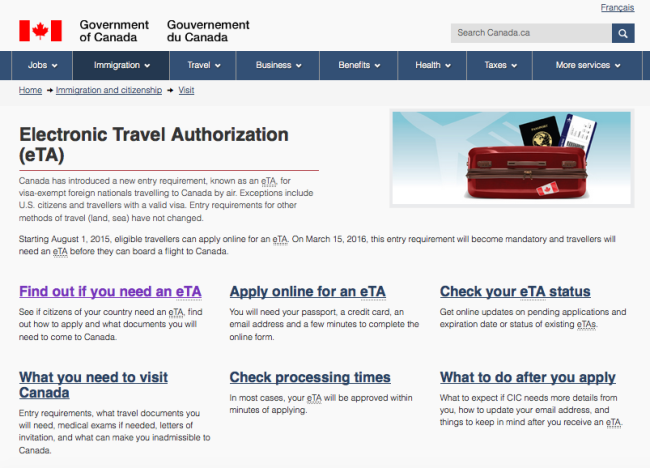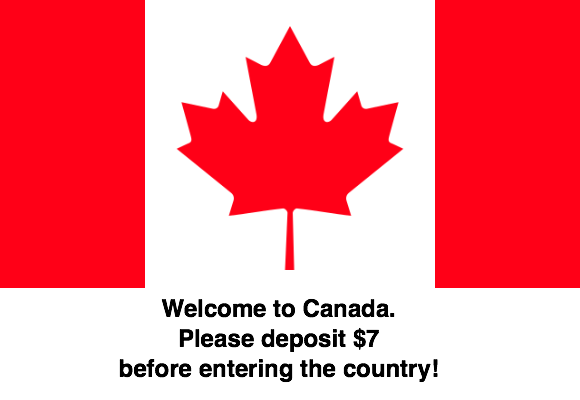If you’re going to the Commonwealth of Canada, it could be time to read up on the entry regulations as the Canadian Government introduce eTA’s – Electronic Travel Authorization.
http://www.cic.gc.ca/english/visit/eta.asp
This programme sound familiar in the least? It should do if you’ve been to the United States of America, and have required an ESTA to enter the country.
Who’s exempt from getting an eTA?
- US Citizens Entering by air, land or sea
- Citizens of various countries if you are entering by LAND or SEA. Entry by AIR requires an eTA.
So if you’re flying into Canada, you will probably require an eTA (even if you’re a US Permanent Resident).
You can find out if you need an eTA or a Visa for entering Canada by air by heading to http://www.cic.gc.ca/english/visit/visas.asp
There’s even a friendly video to gloss over what you need to do:
The good news is that eTA’s will be valid for five years or until a passport has expired (whichever comes first). The bad news is… that this service isn’t free of charge.
It’s CAD$7 for it.
Payment will be accepted by Mastercard, Visa, American Express (and the prepaid variants of it too).
For now, the system is optional – but will be mandatory from the 15th March 2016. If you’re intending to travel before the 15th March 2016, you can still enter with your passport. From the 15th March, you’ll need to have paid your $7 and have a valid confirmation.
For now, there is no visible benifit of applying early (other than just to “get it done and dusted”).
Unlike the US who offered ESTA’s free during the trial period, Canada is going head-long into the charging business.
eTA’s according to the site are processed normally in minutes, with some requiring up to 72 hours to process. Definitive times have yet to be posted.
For international travellers going to Canada – it’s another inconvenience to deal with when travelling and yet another fee to pay.
Yes, it maybe $7, but its still something to think about when travelling on holiday or on business… and no doubt it will catch a few people out when they go to Canada in 2016 and find out they need to complete more paperwork… whilst at the airport.
Welcome to Economy Class and Beyond – Your no-nonsense guide to network news, honest reviews, with in-depth coverage, unique research as well as the humour and madness as I only know how to deliver.
Follow me on Twitter at @EconomyBeyond for the latest updates! You can also follow me on Instagram too!
Also remember that as well as being part of BoardingArea, we’re also part of BoardingArea.eu, delivering frequent flyer news, miles and points to European readers


Despite being part of the Commonwealth and having Her Majesty as head of state, Canada’s official name is not the “Commonwealth” of Canada.
For a while it was the Dominion of Canada, but those of us who were ashamed of our past, decided to drop that as well. Canada is one of the few countries in the world that is officially merely known by its name.
@kevincm
interesting
-what about transit paseangers?
-US citizens exempt, but US perm residents must use eTA?
thanks
Reading the paperwork, eTA will be needed by U.S. Permanent residents.
As transit passengers normally get their passport stamps, I believe they will be treated the same as everyone else. Will try to get an update out on this later
Sounds like a nuisance, but at least it’s cheap – Australia hits visitors up for 20 roobucks for their version. and has been doing it (at various prices) since the late ’90s, at least for us Americans. But given the ridiculous taxes on airfare to Canada, it still seems a bit unnecessary.
Is the revenue raised earmarked for anything, or just general tax revenue?
And am I the only one who finds this whole “it’s not a visa yet…well, it’s sort of a junior visa. But not really.” trend more than a little absurd?
And just ’cause I’m really, really bored at work, a little more on Canada’s name: there are Canadians who argue, between Timbits and sips of coffee*, that it’s still correct to call the country the Dominion of Canada, since provisions of the original British North America Act that aren’t directly replaced or repealed by the Constitution Act 1982 are still in effect, so every July 1st there seems to be an editorial somewhere (usually in the Globe and Mail, from what I’ve seen) wishing people a Happy Dominion Day.
(Any discussion of this almost instantly gets caught up in the larger argument around the eternal issue of relations between Anglo-Canada and Quebec, and whether or not not using the word “dominion” is giving-in to presumed Quebecois oversensitivity, along the lines of the argument about the way the word “Royal” was removed from the Air Force and Navy names for decades. Interpretation of all this depends on your political stance and recent intoxicant consumption.)
And just to really muddy the waters, there are also pedantic types that argue that the BNA Act used a lower-case “d” in the official text, so “dominion” was just an adjective describing Canada’s role within the Empire and never actually part of the country’s official name.
The only moral I can come up with in all this is that Canadians need to be more precise when writing constitutional documents, but that observation isn’t likely to be terribly helpful, especially from someone from a country that couldn’t be bothered to specify whether or not a state had the right to secede after joining the Union in its constitution.
* Before anyone accuses me of stereotyping, I’m just jealous. Timbits are vastly superior to Dunkin’s Munchkins. It’s like Macbeth being played by a junior high school drama club dork versus Sir Patrick Stewart. And yet the Burger King – Tim Horton’s merger has not gotten us Timbits at BK yet. This annoys me more than it probably should.
It’s days like this I wish I had an upvote function on this site when it comes to comments. Interesting points Craig!
Where will US permanent residents who hold NEXUS cards fall within this policy? Presumably the NEXUS card is a vetting of eligible persons entering Canada, allowing them expedited entry, but there seems to be no provision to exempt US permanent resident NEXUS holders from this new ETA requirement. Seems counter-intuitive to require them to hold an ETA in addition to their NEXUS membership